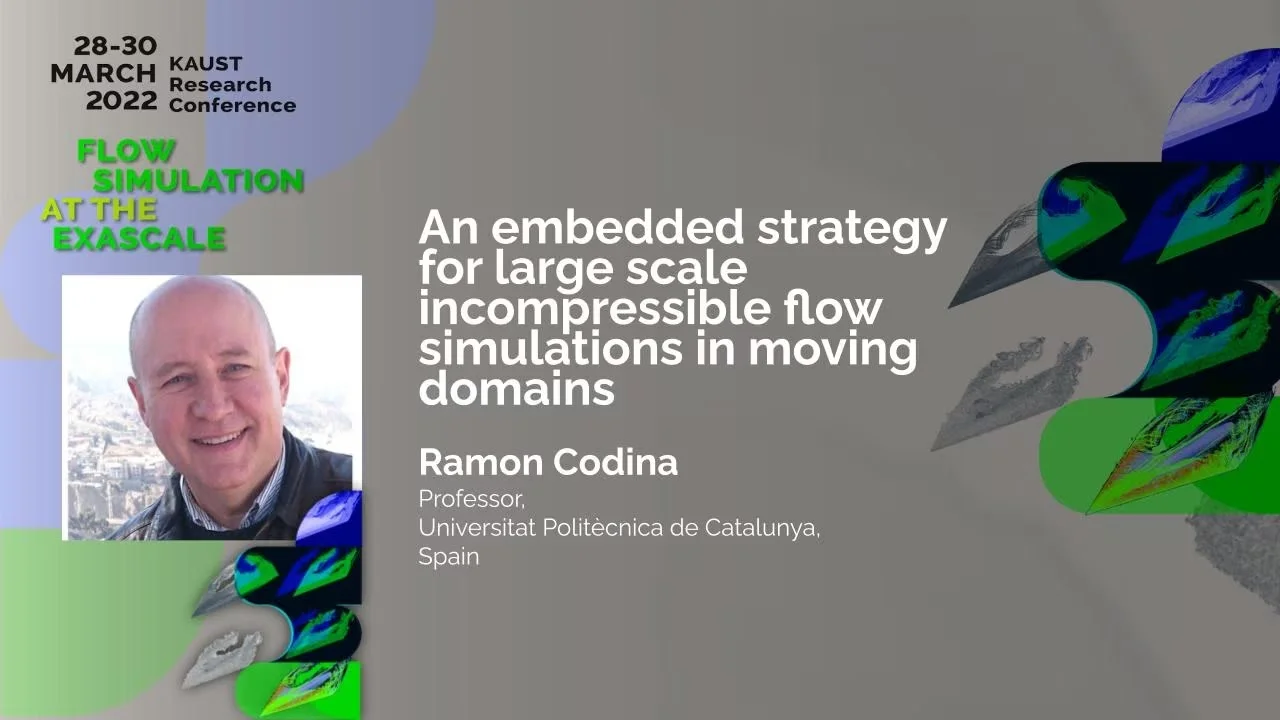
An embedded strategy for large scale incompressible flow simulations in moving domains
- Ramon Codina Professor, Universitat Politècnica de Catalunya, Spain
KAUST Library
In this work we describe a methodology to approximate the incompressible Navier-Stokes equations in time dependent domains. To deal with the motion of the domain, we employ a fixed-mesh method that we call fixed-mesh ALE. It consists of writing the equations in a moving ALE reference system but then projecting them onto a fixed background mesh. This implies that the boundaries of the elements do not necessarily coincide with the physical boundaries, and thus there is the possibility of badly cut elements. We use a Nitsche's type formulation to prescribe the boundary conditions and stabilise the bad cuts introducing a term that penalises the gradient of the unknown orthogonal to the finite element space in a patch that contains the badly cut element. The flow formulation is a stabilised finite element method that allows one to treat convection dominated flows and to use equal velocity pressure interpolation. Furthermore, this formulation can be shown to behave as an implicit large eddy simulation approach. A key issue is that the sub-grid scales on which the formulation depends are allowed to be time dependent; this fact has proved to be crucial for the robustness of the approach. Finally, the calculation of the velocity and the pressure is segregated by using a fractional step scheme designed at the pure algebraic level. The strategy described is applied to real life problems, and in particular to the simulation of the air flow generated by a train moving inside a tunnel.
Overview
Abstract
In this work we describe a methodology to approximate the incompressible Navier-Stokes equations in time dependent domains. To deal with the motion of the domain, we employ a fixed-mesh method that we call fixed-mesh ALE. It consists of writing the equations in a moving ALE reference system but then projecting them onto a fixed background mesh. This implies that the boundaries of the elements do not necessarily coincide with the physical boundaries, and thus there is the possibility of badly cut elements. We use a Nitsche's type formulation to prescribe the boundary conditions and stabilise the bad cuts introducing a term that penalises the gradient of the unknown orthogonal to the finite element space in a patch that contains the badly cut element. The flow formulation is a stabilised finite element method that allows one to treat convection dominated flows and to use equal velocity pressure interpolation. Furthermore, this formulation can be shown to behave as an implicit large eddy simulation approach. A key issue is that the sub-grid scales on which the formulation depends are allowed to be time dependent; this fact has proved to be crucial for the robustness of the approach. Finally, the calculation of the velocity and the pressure is segregated by using a fractional step scheme designed at the pure algebraic level. The strategy described is applied to real life problems, and in particular to the simulation of the air flow generated by a train moving inside a tunnel.
Brief Biography
Prof. Codina graduated in Mathematics from the Universitat Autònoma de Barcelona and in Civil Engineering from the Universitat Politècnica de Catalunya (UPC), both in Barcelona. Also from the UPC, he obtained a Ph.D. degree in 1992.
His academic career started at the UPC as research assistant in 1990. He obtained a position similar to Associate Professor in 1993 and since 2001 he is Full Professor. He teaches courses on continuum mechanics, structural mechanics, applied mathematics and numerical methods in fluids. This last topic is also his main field of research.
His major academic awards are the “Award from the Catalan Government to young researchers” in June 2000, the “J.L. Lions Award to Young Scientists in Computational Mathematics” from ECCOMAS in September 2000, the “IACM Young Investigator Award”, from The International Association for Computational Mechanics (IACM) in September 2004, the “ICREA Acadèmia”, awarded in 2011, 2016 and 2021 (see https://www.icrea.cat/en/icrea-academia-awardees), from the Catalan Government, the “IACM Fellowship” from IACM in 2012, and the Prandl medal from Eccomas in 2018.